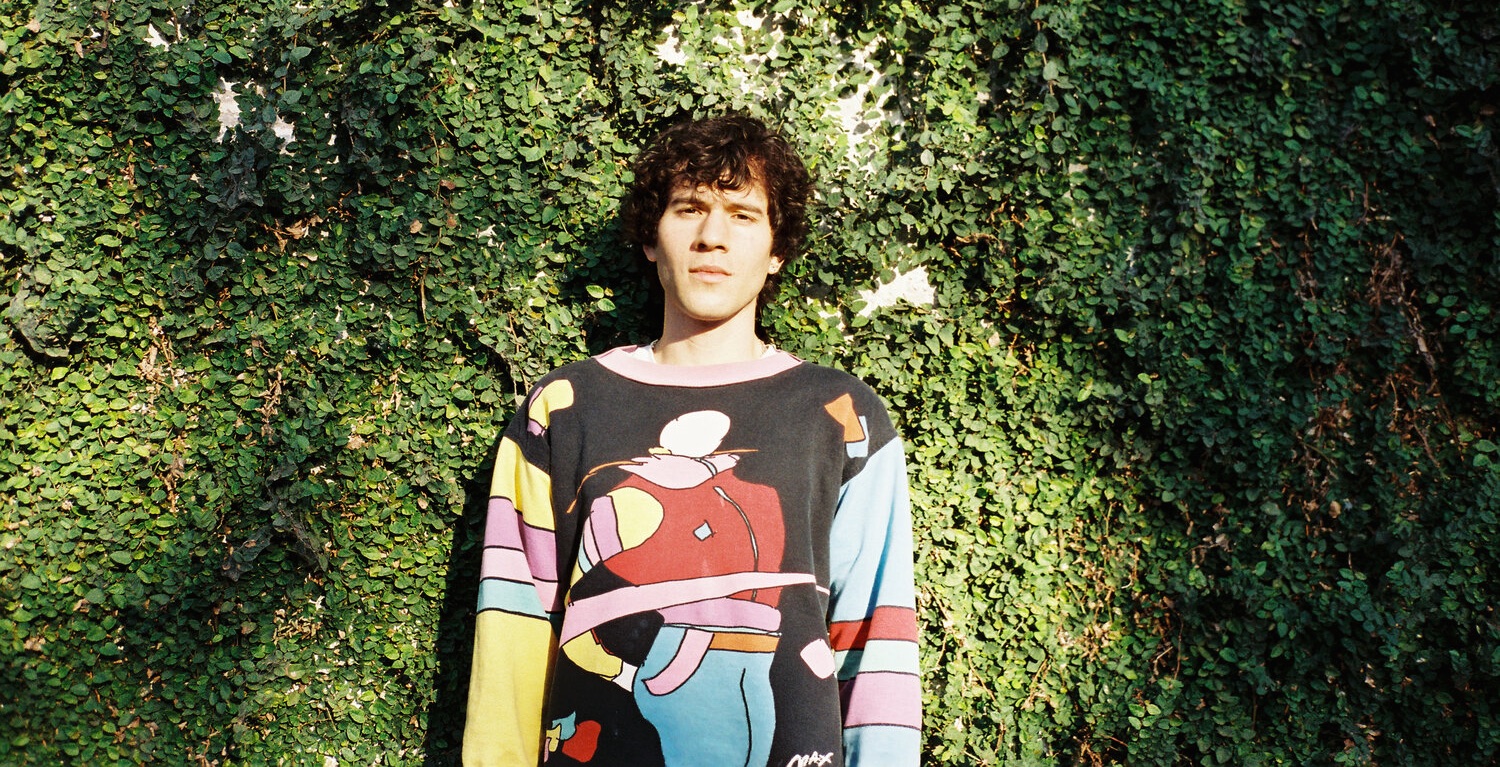“I’ve been thinking a lot about ants recently…LA always gets serious ant infestations in the summers—there’s just ants everywhere.” Brad Oberhofer is making a bit of small talk while he fills up his CamelBak after I’ve asked the first question of our interview, calling a brief audible before he’s left the house for the walk he planned on taking to wake himself up a bit for our chat. “The thing that most people do is just kill them. They’re like, ‘I’m just gonna crush these guys, they’re in my house, it’s not, like, a cleanly thing to have them running around.’ And then they just stomp them out. Recently I reached for an ant and squished it, and I was like, ‘I just squished the life out of a thing, what a terrible feeling.’ I was just thinking about the nature of how we do things in the name of humanity and civilization and…yeah, anyway, just something to think about.”
The question I asked was about the origins of “What Does It Mean to Me?,” the single he released last month and which today sees a music video directed by his partner, actress/filmmaker Fabianne Gstottenmayr, with animation from musician/illustrator John Andrews. The single has achieved more staying power than most of the other one-off tracks he’s put out since his last album, 2015’s Chronovision, whether or not that’s due to the interference of the label contract he stepped away from a few years back. Recorded with pianist Nicky Paul—a former Tony Bennett hired hand—and harpist Naomi Greene, with Jonathan Rado and Andrew Sarlo helping to produce, the song clearly also has more firepower behind it than his other, more lo-fi recent singles like “Makeup” and “Eye Lv U.” Further, behind its glossy pop sheen lies a heavy existential question, which becomes infinitely heavier once you apply it to a topic like snuffing out a life, no matter how small, or entirely more trivial in, well, most other cases.
“It was just how I felt at that time,” he continues, fully hydrated, out the door, and ready to address the question. “I’d been in an extreme label struggle where I wasn’t allowed to release any music, where formerly my career was releasing songs and deriving joy and fulfillment from sharing music with people—that was, like, my life’s meaning. Then after several years of struggle with that, having to reconfigure my focus and reshape my lens, everything kind of became hazy. I developed a more surrealist and existential approach toward life. ‘What Does It Mean to Me?’ is sort of just about how most things aren’t really a big deal, and how if you’re hung up on something, it’s useful to take a step back and ask yourself: ‘What does this really mean to me? What are its implications on my existence as a whole?’ The answer will usually mean that it doesn’t mean much.”
“If you’re hung up on something, it’s useful to take a step back and ask yourself: ‘What does this really mean to me? What are its implications on my existence as a whole?’ The answer will usually mean that it doesn’t mean much.”
There’s plenty to unpack here—way more than you’d expect if you’ve heard the song, which, again, is a playful pop tune interpolating near-rapped verses (“I won the Mason Middle School eighth grade freestyle battle championship” Brad informs me) that even feels weightless among Oberhofer’s discography of love songs that seem fluently translated from the brain of an adult into that of a child, then transferred back into the body of an adult, or at least the body of an extremely prodigious child with a startling competence playing numerous instruments. This is the guy who turned a simple poem about a broken heart into the grandiose, near-operatic opener to his debut album now flipping that formula on its head with an elaborate philosophical breakthrough being soundtracked by instrumentation clearly written by someone who’s recently undergone the revelation that very little in one’s personal life is all that important. “The song is kind of an optimistic, crooning expression of that existential viewpoint,” he summarizes with a laugh, likely upon realizing the flip side to the point he’s just made, which is essentially that nothing matters.
What he means by this, though, is that one shouldn’t be held down by self-imposed creative or personal constraints, a lesson he learned the hard way over the years after essentially planning out the trajectory of his entire career when he was a teenager. “This kind of questioning can oftentimes come from a dark place, but at the time this song was written I had evolved out of that dark place and had very much accepted that I may never know what my life’s true direction is pointing toward,” he says with both a bit of a laugh and a hint of quavering to his voice. “And that’s OK, and it’s fun, and it’s a happy thing. If you accept that you don’t know what any of this is, and that that’s fine, and that even formulating expectations for the most part is detrimental to one’s ability to find happiness and meaning in existence, then everything feels lighter.”

photo by Coley Brown
His new music sounds lighter, too, if “What Does This Mean to Me?” is any indication. As if to parallel that lightness, the visual he’s debuting for the track pairs candid and characteristically goofy vacation footage of Oberhofer with Andrews’ wobbly, Snowman-esque animation. “Basically, combining this animation with footage that was just me not taking shit too seriously felt like it represented the song properly—kind of like ‘nothing matters, enjoy the world, and play with your surroundings in a way that’s healthy for your brain,’” he explains, paralleling the “anything goes” and “just do what the fuck ever you wanna do” philosophies he spouted earlier in our conversation.
“Basically, combining this animation with footage that was just me not taking shit too seriously felt like it represented the song properly—kind of like ‘nothing matters, enjoy the world, and play with your surroundings in a way that’s healthy for your brain.’”
In following this new mentality, Oberhofer released the single through Telefono Records, whose label head Ross Nicol connected with Brad directly. “He was like, ‘Hey, I’ve been a fan of yours for about eight years, what’s going on with your music?,’ he recalls. “And I was like, ‘Well, I’ve got a lot of songs, but I can’t really afford to make an album the way that I hear it,’ and he was like, ‘I want to pay for you to make music.’” A year since connecting, Oberhofer’s kept busy recording, if his recent Instagram stories frequently featuring familiar faces from the indie rock scene are any indication. Central also to the equation is Rado, with whom Oberhofer has a longstanding chemistry. “When we make music together it’s very chaotic, like any idea is worth trying. We make insane music, and then we try to reel it in after”—he trails off—“usually.”
All of this, of course, is in stark contrast to his experience working within the censorship of a major label. It’s easy to hear “What Does It Mean to Me?” and think of it as a deviation from what “Oberhofer” as a project has been for the past decade, when in reality it’s more a step away from what his label wanted the project to be. “They had expectations for my music—weird expectations for my music, sometimes that never had anything to do with me in the first place,” he shares. “Now I’m just doing whatever feels good.”
What feels good for him currently is making pop songs that are simultaneously carefully curated and which possess a “spirit of recklessness”—though it’s hard to say how long that M.O. will last. “Bowie never made the same album twice, that’s for sure,” he concludes. “Lou Reed reinvented himself a lot; Neil Young made that weird Trans album—his label hated it. I think most of the greatest artists really reinvented themselves multiple times, so any expectation for a band to sound the same is stupid. It really holds people back—no one should feel beholden to the past in terms of the trajectory of their artistry.” FL









